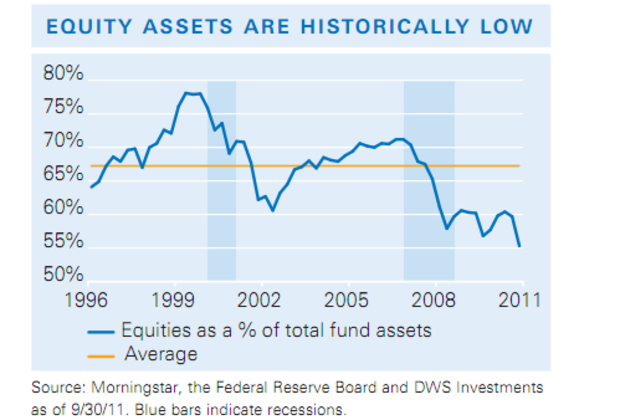Why it's good news that investors hate stocks
Two massive bubbles, a decade of negative real returns and rollercoaster volatility have left investors fed up with stocks. Why else would their mutual fund equity holdings be at an all-time low relative to other asset classes?
But that disgust with stocks can also be seen as a fount of pent-up demand, meaning long-term investors might want to raise their current allocation to equities, say strategists at DWS Investments, part of Deutsche Bank Group (DB), in a new report to clients.
"Equity holdings continue to be much lower than historical averages, despite encouraging fundamentals in Corporate America," writes Owen Fitzpatrick, chief investment strategist for equities at DWS Investments. "In our opinion, investors can't stay underweight equities forever."
2012 Outlook: Stocks will beat bonds
Jeremy Grantham's 4 tips for investors
7 strategies for investing in a volatile market
Fund-industry statistics show that investors currently hold fewer equities relative to other asset classes than at any time in history, DWS notes.
A decade ago, both U.S. and international stocks comprised nearly 80 percent of mutual fund allocations. That number dropped to just over 60 percent in 2003, climbed above 70 percent in 2006 and currently sits at about 55 percent -- well below the 15-year average of 68 percent. See the chart, courtesy of DWS, below:
At the same time, corporate fundamentals are encouraging, DWS says. Earnings and operating margins are very strong. The stock market's valuation, while up for debate, is at least reasonable, by DWS' reckoning. And, importantly, corporations have cut debt and stockpiled cash -- cash that could be used for mergers and acquisitions, share buybacks and dividends.
So what will release this supposed pent-up demand for stocks? Certainly the resolution of some macroeconomic uncertainties would do a lot to help, most notably the current state of affairs in Europe, DWS says.
But impossibly low yields on cash and bonds should also push investors back into stocks, especially once some confidence in the global economic landscape returns.
"We believe the economy continues to face significant challenges, however that doesn't mean that there are not opportunities in the market," Fitzpatrick writes. "As the worrisome macro issues move toward resolution, we expect the number of opportunities to increase."
